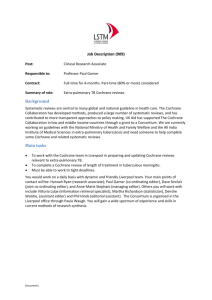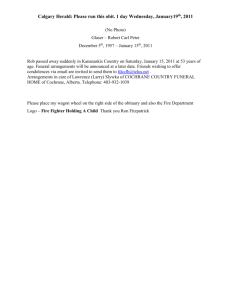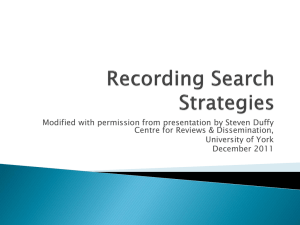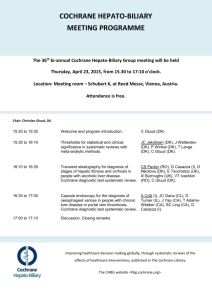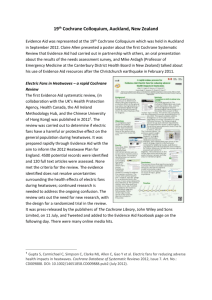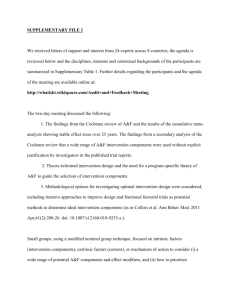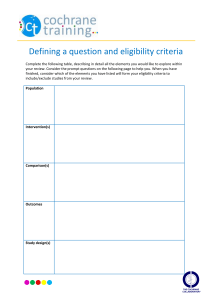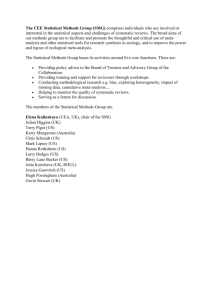Laura to ask presenters if okay if we post their presentations on our
advertisement
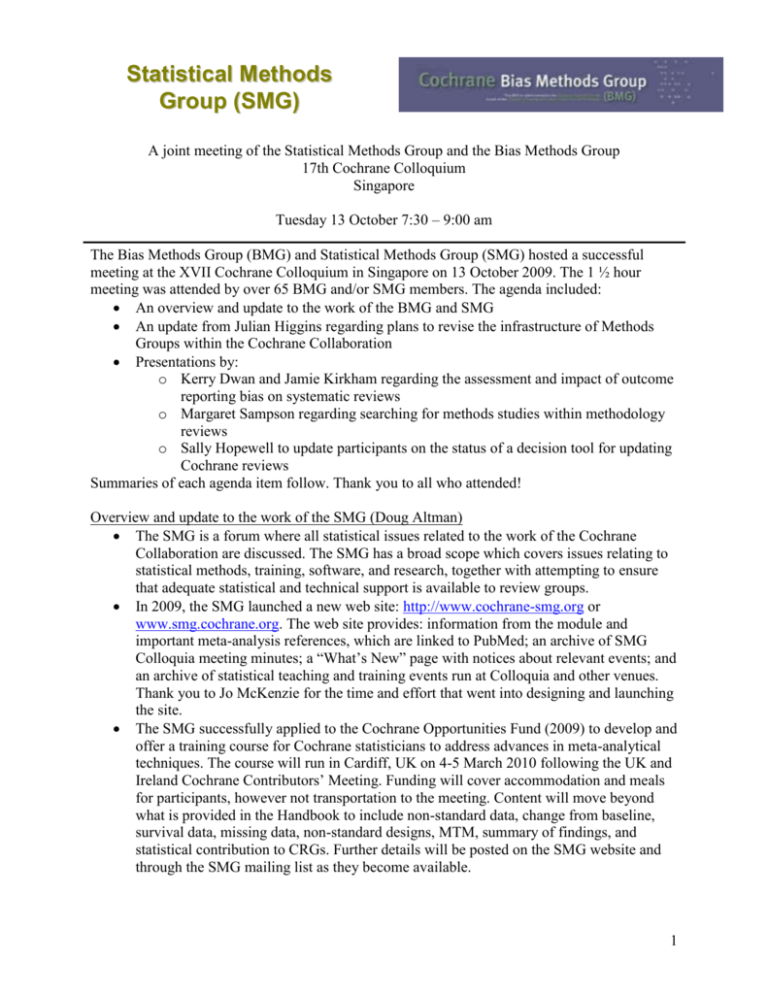
Statistical Methods Group (SMG) A joint meeting of the Statistical Methods Group and the Bias Methods Group 17th Cochrane Colloquium Singapore Tuesday 13 October 7:30 – 9:00 am The Bias Methods Group (BMG) and Statistical Methods Group (SMG) hosted a successful meeting at the XVII Cochrane Colloquium in Singapore on 13 October 2009. The 1 ½ hour meeting was attended by over 65 BMG and/or SMG members. The agenda included: An overview and update to the work of the BMG and SMG An update from Julian Higgins regarding plans to revise the infrastructure of Methods Groups within the Cochrane Collaboration Presentations by: o Kerry Dwan and Jamie Kirkham regarding the assessment and impact of outcome reporting bias on systematic reviews o Margaret Sampson regarding searching for methods studies within methodology reviews o Sally Hopewell to update participants on the status of a decision tool for updating Cochrane reviews Summaries of each agenda item follow. Thank you to all who attended! Overview and update to the work of the SMG (Doug Altman) The SMG is a forum where all statistical issues related to the work of the Cochrane Collaboration are discussed. The SMG has a broad scope which covers issues relating to statistical methods, training, software, and research, together with attempting to ensure that adequate statistical and technical support is available to review groups. In 2009, the SMG launched a new web site: http://www.cochrane-smg.org or www.smg.cochrane.org. The web site provides: information from the module and important meta-analysis references, which are linked to PubMed; an archive of SMG Colloquia meeting minutes; a “What’s New” page with notices about relevant events; and an archive of statistical teaching and training events run at Colloquia and other venues. Thank you to Jo McKenzie for the time and effort that went into designing and launching the site. The SMG successfully applied to the Cochrane Opportunities Fund (2009) to develop and offer a training course for Cochrane statisticians to address advances in meta-analytical techniques. The course will run in Cardiff, UK on 4-5 March 2010 following the UK and Ireland Cochrane Contributors’ Meeting. Funding will cover accommodation and meals for participants, however not transportation to the meeting. Content will move beyond what is provided in the Handbook to include non-standard data, change from baseline, survival data, missing data, non-standard designs, MTM, summary of findings, and statistical contribution to CRGs. Further details will be posted on the SMG website and through the SMG mailing list as they become available. 1 The SMG module is in the process of being updated, and will be posted to the website when it is available. The Cochrane Training Working Group has received funding through the Cochrane Opportunities Fund (2009) to develop a set of standardized training materials. They have approached the SMG Co-convenors for feedback on materials they use for review and author training. Current materials cover basic concepts such as effect measures for binary outcomes, effect measures for continuous outcomes and heterogeneity. Joseph Beyene will be contacting some SMG members soon for assistance in reviewing statistical training materials. Overview and update to the work of the BMG (Laura Weeks) The focus of the BMG is to investigate a range of different forms of bias within systematic reviews. BMG members share an interest in raising awareness of the problem of bias in reviews and developing solutions to reduce their impact. Currently, there are approximately 105 BMG members from across 19 countries on 5 continents. The BMG is funded through a 5-year grant (2005-2010) from the Canadian Institutes of Health Research and the Canadian Agency for Drugs and Technology in Health. Funding allows for a full-time Coordinator, and for the BMG to offer author training workshops and to conduct methodology reviews and methodological research. The BMG also actively offers policy advice and support to the Cochrane Collaboration. Since the last substantive meeting in Freiburg, the BMG has contributed the following to the Cochrane Library: o Checking reference lists to find additional studies for systematic reviews (Protocol, led by BMG member Tanya Horsley) o Publication bias in clinical trials due to statistical significance or direction of trial results (Review, led by BMG member Sally Hopewell) o Blinded versus unblinded assessments of risk-of-bias in studies included in a systematic review (Review in progress, recently submitted for editorial approval, led by BMG Convenor David Moher). o Is using the consolidated standards of reporting trials (CONSORT) statement associated with improved quality of reporting of randomized controlled trials? (Registered title, protocol recently submitted for editorial approval, led by BMG Convenor David Moher) o Comparison of Trial Protocols to Published Reports (Registered title, led by BMG member Rebecca Smyth) In the most recent version of the Cochrane Handbook, the BMG authored two chapters: o Higgins JPT, Altman D. Assessing Risk of Bias in included studies. Part Two. Chapter 8. o Sterne J, Egger M, Moher D. Addressing reporting biases. Part Two. Chapter 10. In addition, BMG Convenors individually contributed to updates of separate chapters: o Deeks JJ, Higgins JPT, Altman DGA. Analyzing data and undertaking metaanalyses Part Two. Chapter 9. o Higgins JPT, Deeks JJ, Altman D. Special topics in statistics. Part Two. Chapter 16. Over the coming year, the BMG will focus on: o Evaluating the Risk of Bias tool (funded by the Cochrane Opportunities Fund) 2 o Conducting methodology reviews o Offering training workshops and developing a network of trainers o Exploring means to efficiently update systematic reviews Update on plans to revise Methods Group Infrastructure within the Cochrane Collaboration (Julian Higgins) Currently there are many chaotic and complicated links joining the various methods groups within the collaboration. Further, there is no easy route for methods groups to provide policy advice to the Cochrane Collaboration Steering Group. Within this context, there is a need to reconsider the roles and function of methods groups within the Collaboration. A new and more efficient organizational structure has been proposed that provides for a more strategic view of the role of methods groups within the Collaboration. The proposal includes: Establishing a Methods Board (to replace the Handbook Advisory Group) as the main forum for discussion of cross-cutting methodological issues in the Collaboration, including recommending methods for Cochrane reviews and overseeing the Handbook. Members will include representatives from each Methods Group. Creating a Methods Executive (8 members from the Methods Board) to coordinate and oversee methods initiatives in the Collaboration. The Executive will be the main conduit between the Steering Group and the Editor-in-Chief. Replacing the Handbook Advisory Group with a Handbook Editorial Advisory Panel, which will oversee the production of the Handbook only. Members will include editors, methods experts and authors for each Handbook. Developing new infrastructures to improve implementation of high quality methods by forming networks of identified Cochrane Review Group-based methods individuals. Revising core functions and expectations of Methods Groups to reflect the variation in topic areas among the Methods Groups and the possibility that they may host networks of Cochrane Review Group-based people with particular responsibility for methods within their groups. Julian stressed that he is interested to hear ideas from Collaboration members who are providing methodological support to Cochrane authors for how to best support authors through the new networks. The assessment of impact of outcome reporting bias on systematic reviews (Jamie Kirkham and Kerry Dwan) Jamie and Kerry first built a convincing case that outcome reporting bias is a potential threat to the validity of systematic reviews and meta-analyses. Their ORBIT study (Outcome Reporting Bias In Trials; PI: Paula Williamson) revealed that 30% of the included reviews had at least one study with a high suspicion of outcome reporting bias. They define outcome reporting bias as the “selection of a subset of the original recorded outcomes, on the basis of the results, for inclusion in publication”. Next, they discussed different available methods for assessing outcome reporting bias, including: Enumeration (Williamson and Gamble, 2005) Bound for maximum bias (Copas and Jackson, 2004 and Williamson and Gamble, 2007) 3 Parametric selection model (Jayasekara, 2009) Regression (Moreno, 2009) The presenters described that each method has its relative strengths and weaknesses in terms of application and complexity and that none of the methods is a direct solution to the problem of outcome reporting bias. Further, there are some situations in which none of the described methods would be appropriate. The discussion of different available methods was supplemented by a series of examples of recalculated effect estimates from published meta-analyses using the Moreno and Bias bound methods. Finally, the ORBIT Classification System was presented, which outlines a system for ranking primary studies at high or low risk of outcome reporting bias. The presentation offered during our meeting is currently unavailable for circulation; however the presenters are working on a related manuscript and will advise BMG and SMG members when that is available. Searching for Methods Studies (Margaret Sampson) Margaret first outlined a set of standard steps to follow when designing a search strategy for any systematic review, and subsequently focused on those steps that require special attention when searching for methods studies. The standard steps follow: 1. 2. 3. 4. 5. 6. 7. 8. Formulate a question Choose the appropriate database Define your search strategy Select the best Subject Headings Select Text words (if needed) Combine search terms Limit your search (if needed) View and save results The steps that require specific attention when searching for methods studies within methodology reviews are in italics above. Margaret expanded on each of these steps as follows: Choosing an appropriate database Margaret described that while intervention studies tend to be reported in MEDLINE, methods papers tend to be within the databases of their disciplines (i.e. which is not always medicine). Some useful databases to consider for mathematical and statistical issues are MathSciNet, Zentralblatt MATH, Current Index to Statistics, Web of Science and JSTOR. Other disciplines with well developed databases that will contain methodological papers include education, psychology, economics, computer science and library science. Define your search strategy A search strategy should be guided by the research question, ideally developed following PICO. In the case of methods studies, a strategy might be to develop a PICO based research question 4 with a methods filter. Methods filters are used to screen through the content part of the search (i.e. population and intervention) to leave only specific types of articles. Select the best Subject Headings Margaret made the distinction within bibliographic records between subject headings, which are what the paper is talking about, and publication type, which is the type of publication. For methods studies, we are searching for subject headings and not publication types, although the terms “meta-analysis” and “randomized controlled trial”, for example, would apply to both. Select Text words (if needed) In some searches text words are used in addition to subject headings, for example if no subject heading exists for a topic of interest. When choosing text words to include in a search it is important to include common spelling mistakes, different spellings of words and also different word endings (e.g., randomization and randomisation). Margaret concluded with an example from a study she conducted of search strategies for methods papers, indicating that it can be very difficult to find, even indexed, methodology papers (Sampson M, Daniel R, Cogo E, Dingwall O. Sources of evidence to support systematic reviews in librarianship. J Med Libr Assoc 2008; 96(1):66-69). With the intent of improving the future searchability of methodology papers, Margaret recommends nominating quality methodology references to the Cochrane Methodology Register. A decision tool for updating Cochrane Reviews (Sally Hopewell) Sally described that while current Cochrane guidance is that all reviews should be updated every two years, this guidance is not based on empirical evidence. She describes that if reviews are updated too late, there is potential to miss important evidence and for decisions to be based on out-of-date information. On the other hand, if reviews are updated too early there is the potential to waste scarce resources and also introduce bias: studies with significant results tend to be published quicker than those with non-significant results. Recognizing the importance to developing an evidence-based approach to updating guidance, Sally and colleagues successfully applied to the Cochrane Opportunities Fund (2007) to conduct a project to develop a decision tool for this purpose. The tool would draw on the evidence base for updating systematic reviews, current guidance in the Cochrane Handbook and RevMan, guidance from the Cochrane Updating Working Group, and checklists from agencies and Cochrane entities. The outcome of this project was a two step process: 1) a decision tree to identify triggers for updating a review; and, 2) a checklist to be used if authors decide a trigger is likely to change the conclusions of the review. The decision tree is available from the BMG website (see “BMG News” and download Sally Hopewell’s presentation from this meeting). It walks review authors through a series of triggers to identify whether different scenarios are likely to change the conclusions of the review or not. If for any reason the conclusions of a review are likely to be changed, the review should be 5 updated. If the conclusions are not likely to change, the recommendation is to update the search dates within the published review to make it apparent that recent literature has been looked at. In this case, new studies can be cited within the review although their results would not be incorporated. Sally and colleagues are currently conducting a pilot study to assess the feasibility of using the updating tool. Unfortunately this pilot is taking longer than anticipated because the participant authors are taking approximately 1-2 years to update their reviews. Despite the delay, there has been positive feedback regarding the tool. Results of pilot testing will be used to refine the tool. In addition to piloting the decision tool, there are plans to incorporate statistical methods developed by Sutton (Sutton AJ et al. An encouraging assessment of methods to inform priorities for updating systematic reviews. Journal of Clinical Epidemiology 2009;62:241-51) for the prioritization of updating a portfolio of reviews, essentially aiming to bring these two tools together. Finally, this team has plans to discuss potential implementation of the decision tool within the Cochrane collaboration with the Handbook Advisory Group, the Cochrane Quality Advisory Group and David Tovey, as part of the updating efforts within the Collaboration. Summary We thank all participants for their time attending this early morning meeting and hope they found it useful. As this meeting represents the first joint meeting of the BMG and SMG, we would appreciate hearing perspectives of BMG and SMG members regarding the joint meeting format and whether this is an option either group should pursue in future years. If you have comments, please forward them to BMG Coordinator Lucy Turner (lturner@ohri.ca). 6
